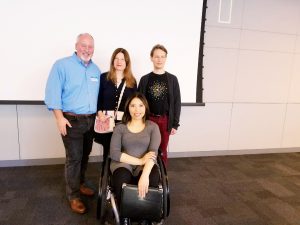
Attendee Rosse Strada poses for a photo with panelists Joseph Fox, Karo Caran and Victor Tsaran at the “Disablilty At Work” Panel hosted by Communications Studies students.
By Riley Wilcox and America Yamaguchi, Communication Studies students
On May 5, San Jose State University students hosted a panel on “Disability at Work. Students enrolled in Communication Studies 132F Dis/Ability Communications with Professor Bettina Brockmann coordinated the three-person panel event that was open to the public in the Dr. Martin Luther King. Jr. Library. The event was widely publicized, with invitations going out to the entire Communication Studies department as well as all Accessible Education Center (AEC) registered students, and a Facebook event post that made it clear the event was open to the public. The panel’s purpose was to inform the audience about employment and accessibility difficulties for people with disabilities.
The speakers included Victor Tsaran, technical program manager at Google, Karo Caran, who also works in accessibility at Google and is an accomplished author, and Joseph Fox, senior vice president at SAP Ariba.
Tsaran and Caran presented together, speaking on their experiences growing up as vision-impaired children in Ukraine and Poland respectively, and the differences in their experiences in mainstream and specialized education programs. Tsaran and Caran both work with Google to increase the accessibility of the user interfaces for Google and Google Play. They concentrated on perspectives in ableism for people with disabilities, and the similarities between ableism and other forms of oppression such as racism, sexism and homophobia.
Dreams became a theme that emerged throughout the event. Caran pursued a dream of studying Chinese that early instructors had hesitated about due to her vision impairment.
“I work in the business of dreams,” Tsaran said. “I had a few dreams—I wanted to teach history at my school of the blind. But [when I came to the United States], my dreams expanded as my horizons were expanded.”
He noted that his university’s dedication to accessibility created a capacity for dreams he had not had before. Working in the tech industry, the pair also spoke on how computers are “great enablers,” that allow people to speak, get their point across and have a sense of self. Caran explained that because times are changing, and so much of the world is now accessed through an electronic platform, society must more than ever make sure that computer technology is accessible for everyone.
Joseph Fox, who also works in the tech industry, is the parent of four children, three of whom are on the Autism spectrum. Fox spoke on always having a “parent view” before having a “business view.” He said he has found as a father, as an employer and as a student, there were many challenges for people with disabilities. Fox presents frequently on the benefits of hiring a neurodiverse workforce, informs parents of resources for their children, informs young adults with an Autism Spectrum Disorder on toolsets and programs to aide them, and highlights for employers the best ways to incorporate accessibility into the workforce. Some of his key advice includes self advocacy and the benefits of finding peers and mentors who can help young adults to obtain the accommodations they need. He also recommends employers to develop hiring processes that do not involve interviews because people who are capable of the job may not always be impressive during interviews. Under Fox’s leadership, SAP Ariba announced in May 2013 a goal of having one percent of its global workforce represented by those on the Autism Spectrum.
After Fox’s presentation, the floor was opened to audience questions. Some of the key messages were that accessibility development requires trial and error, and that the best way to reduce ableism is to maximize exposure by reading and meeting more people with disabilities.